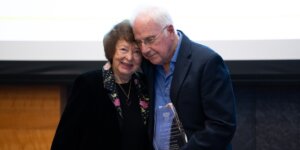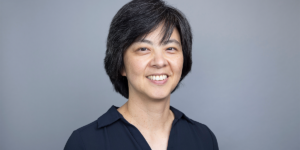
Yasser Khan in his lab earlier this year. He’s only the third USC professor to become a Packard Fellow. (USC Photo)
Yasser Khan has focused his research on wearables, implantables, and ingestibles — advanced medical devices designed to gather data and ultimately improve human health. His ideas are futuristic and visionary. They’re just what the David and Lucile Packard Foundation was looking for.
The nonprofit is supporting Khan’s work by making him one of 20 Packard Fellows for Science and Engineering for 2024. The coveted fellowship awards $875,000 over five years to early-career scientists and engineers who are “pushing the boundaries of science and innovation in their fields of study.”
It marks only the third time a USC professor has received a Packard Fellowship, and all three have come from the Ming Hsieh Department of Electrical and Computer Engineering: Alan E. Willner won in 1993 and Mahdi Soltanolkotabi in 2018.
“I had a challenging project in mind. But that type of work needed support from the likes of the Packard Foundation, as they support ambitious work.”
Khan, an assistant professor of electrical and computer engineering who joined USC in 2022, knew a Packard was a tall order. Past recipients have gone on to achieve world-changing work and become famous in their own right: Last year’s Nobel Laureate in chemistry, Moungi Bawendi, is a fellow, as is this year’s chemistry Laureate, David Baker. Fellows have received Fields Medals, Alan T. Waterman Awards, Breakthrough Prizes, Kavli Prizes, and have been elected to the National Academies of Science, Engineering, and Medicine. Khan talked to some past fellows.
“After knowing who the previous fellows are and what they achieved, I knew this was a highly selective fellowship, and that the chances were low,” Khan said. “But I was hopeful, because the project is super-exciting.”
“They were looking for ideas that go way beyond compared to what typical grant mechanisms would fund is a high-risk, high-reward, almost blue-sky research idea,” he added. “I had a challenging project in mind. But that type of work needed support from the likes of the Packard Foundation, as they support ambitious work.”
Back to Khan’s work: He and his Ph.D. students in the Khan Lab, including Angsagan Abdigazy, have demonstrated the potential of using devices a patient could wear, and tinier devices he or she could swallow — so-called “smart pills” — that would transmit sensor data to be analyzed and possibly lead to early gastrointestinal disease detection.
“When the ingestible is passing through, we can record the signals it sends,” he said. “The gut is the second brain. And if you can monitor neural activity and also neurochemicals with implants in the brain and ingestibles in the gut, it will be a very powerful platform for studying the gut-brain axis.
“My vision is to create accessible technology for health and neuroscience. With the generous support from the Packard Foundation, I will be able to pursue my goal of creating exciting healthcare technologies and make them accessible to everyone.”
Published on October 15th, 2024
Last updated on October 16th, 2024












